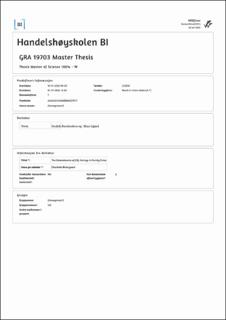The Determinants of ESG Ratings in Family Firms : Evidence from the Nordic Market
Abstract
By drawing on a sample of 528 public-traded corporations in the Nordic
countries, this thesis explores the determinants of ESG ratings in family firms.
We address three important research questions: (1) are family firms associated
with lower ESG ratings than non-family firms; (2) do the unique characteristics
of family firms materialize in a different prioritization of E, S, and G initiatives
than their non-family counterparts; and (3) is the extent to which a family
can control the firm’s behavior decisive for their ESG rating. We find that
family firms exhibit lower ESG ratings than non-family firms because they
underperform on ESG initiatives that may threaten family control. Specifically,
family firms tend to downgrade initiatives that affect internal stakeholders
(managers, shareholders, and the workforce). However, they show the same
level of ESG engagement as non-family firms on initiatives that concern external
stakeholders and thus give reputational benefits. Furthermore, we demonstrate
that family firms’ ESG ratings are highly contingent upon the family’s ability
to shape the firm’s behavior, goals, and strategies. We find that in firms with
a family member as CEO or if the family controls the board of directors, the
ESG ratings are even lower. On the contrary, family-founded firms have better
ESG ratings than other family firms. Our theoretical contribution is based on
the concept of SEW. We argue that retaining family control is the most critical
factor in shaping family firms’ ESG engagement.
Description
Masteroppgave(MSc) in Master of Science in Business, Finance - Handelshøyskolen BI, 2022
